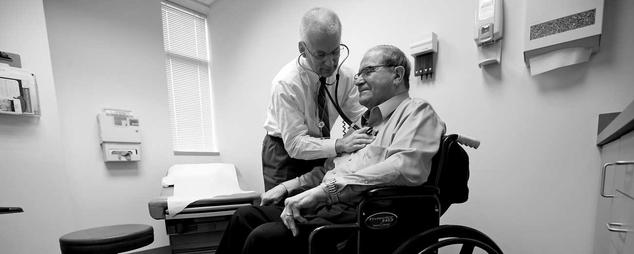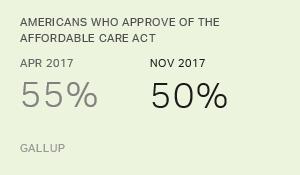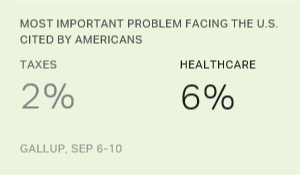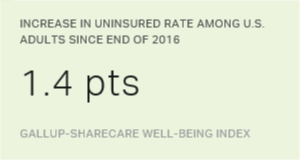Story Highlights
- 65% say ACA has successfully expanded access to coverage
- Public is divided on whether it has reduced healthcare costs
- Democrats see law as successful; Republicans see it as unsuccessful
WASHINGTON, D.C. -- Nearly four years after key provisions of the Affordable Care Act took effect, most U.S. adults say the law has been successful in expanding access to healthcare coverage. However, they are divided on whether it has reduced healthcare costs for Americans.
| Very/Somewhat successful | Very/Somewhat unsuccessful | ||||||||||||||||||||||||||||||||||||||||||||||||||||||||||||||||||||||||||||||||||||||||||||||||||
|---|---|---|---|---|---|---|---|---|---|---|---|---|---|---|---|---|---|---|---|---|---|---|---|---|---|---|---|---|---|---|---|---|---|---|---|---|---|---|---|---|---|---|---|---|---|---|---|---|---|---|---|---|---|---|---|---|---|---|---|---|---|---|---|---|---|---|---|---|---|---|---|---|---|---|---|---|---|---|---|---|---|---|---|---|---|---|---|---|---|---|---|---|---|---|---|---|---|---|---|
| % | % | ||||||||||||||||||||||||||||||||||||||||||||||||||||||||||||||||||||||||||||||||||||||||||||||||||
| Expanding Americans' access to healthcare coverage | 65 | 33 | |||||||||||||||||||||||||||||||||||||||||||||||||||||||||||||||||||||||||||||||||||||||||||||||||
| Reducing the cost of healthcare for Americans | 47 | 50 | |||||||||||||||||||||||||||||||||||||||||||||||||||||||||||||||||||||||||||||||||||||||||||||||||
| Gallup, Nov. 2-8, 2017 | |||||||||||||||||||||||||||||||||||||||||||||||||||||||||||||||||||||||||||||||||||||||||||||||||||
President Barack Obama signed the healthcare reform act -- also known as "Obamacare" -- into law in 2010. Beginning in 2014, the law required Americans to carry health insurance or pay a tax penalty. To facilitate access to insurance, the law set up health insurance exchanges that offered subsidies for many Americans. Republicans in Congress have tried, unsuccessfully, to repeal the law in recent years.
Consistent with measurements by Gallup and by the Centers for Disease Control and Prevention, the percentage of U.S. adults who lack insurance has declined significantly since the individual mandate requiring Americans to have coverage took effect in 2014. Two-thirds of Americans appear to be aware of this, saying the law has been either "very successful" (23%) or "somewhat successful" (42%) in expanding Americans' access to healthcare coverage.
The perceived impact of the law on consumers' healthcare costs gets mixed reviews. Many Americans are now able to get government subsidies to help pay for their insurance. But the premiums for plans sold on the health insurance exchanges have greatly increased in many markets, and those who are ineligible for subsidies are now paying more for those plans. Also, insurance plans today commonly have high deductibles that consumers must pay before receiving any benefits.
Americans' assessments of the law on the cost dimension are divided -- 47% say it has been very (9%) or somewhat successful (38%) in reducing the cost of healthcare for Americans, while 50% say it has been very (29%) or somewhat unsuccessful (21%).
Democrats See ACA as Successful in Expanding Access, Reducing Costs
Consistent with the strongly partisan attitudes about the law in general, Republicans' and Democrats' perceptions of the law's effects also differ significantly. But all party groups are more likely to believe the law has expanded access to coverage than to believe it has reduced costs.
Specifically, 86% of Democrats versus 37% of Republicans say the law has been successful in expanding access to coverage. Two-thirds of independents (67%) believe the law has expanded access.
On costs, 72% of Democrats believe the law has succeeded in reducing costs, with 49% of independents and 12% of Republicans sharing that view. Nearly nine in 10 Republicans say the law has been unsuccessful in reducing costs.
| Democrats | Independents | Republicans | ||||||||||||||||||||||||||||||||||||||||||||||||||||||||||||||||||||||||||||||||||||||||||||||||||
|---|---|---|---|---|---|---|---|---|---|---|---|---|---|---|---|---|---|---|---|---|---|---|---|---|---|---|---|---|---|---|---|---|---|---|---|---|---|---|---|---|---|---|---|---|---|---|---|---|---|---|---|---|---|---|---|---|---|---|---|---|---|---|---|---|---|---|---|---|---|---|---|---|---|---|---|---|---|---|---|---|---|---|---|---|---|---|---|---|---|---|---|---|---|---|---|---|---|---|---|---|
| % | % | % | ||||||||||||||||||||||||||||||||||||||||||||||||||||||||||||||||||||||||||||||||||||||||||||||||||
| Expanding Americans' access to healthcare coverage | ||||||||||||||||||||||||||||||||||||||||||||||||||||||||||||||||||||||||||||||||||||||||||||||||||||
| Very/Somewhat successful | 86 | 67 | 37 | |||||||||||||||||||||||||||||||||||||||||||||||||||||||||||||||||||||||||||||||||||||||||||||||||
| Very/Somewhat unsuccessful | 14 | 29 | 60 | |||||||||||||||||||||||||||||||||||||||||||||||||||||||||||||||||||||||||||||||||||||||||||||||||
| Reducing the cost of healthcare for Americans | ||||||||||||||||||||||||||||||||||||||||||||||||||||||||||||||||||||||||||||||||||||||||||||||||||||
| Very/Somewhat successful | 72 | 49 | 12 | |||||||||||||||||||||||||||||||||||||||||||||||||||||||||||||||||||||||||||||||||||||||||||||||||
| Very/Somewhat unsuccessful | 24 | 45 | 86 | |||||||||||||||||||||||||||||||||||||||||||||||||||||||||||||||||||||||||||||||||||||||||||||||||
| Gallup, Nov. 2-8, 2017 | ||||||||||||||||||||||||||||||||||||||||||||||||||||||||||||||||||||||||||||||||||||||||||||||||||||
Despite the strong influence of partisanship on consumers' assessments of the law, partisans do make distinctions between how the law has worked in expanding access and reducing costs. While a majority of Republicans, 56%, believe the law has been unsuccessful in accomplishing both goals, four in 10 say it has succeeded in at least one of the two areas. This includes 29% of Republicans who believe the law has expanded access but not reduced costs, plus smaller percentages who believe it has improved costs but not access (3%) or improved both (8%).
Among Democrats, 68% think the law has been successful both in expanding access and in reducing costs, but about one in three believe it has not done at least one of those things.
| U.S. adults | Democrats | Independents | Republicans | ||||||||||||||||||||||||||||||||||||||||||||||||||||||||||||||||||||||||||||||||||||||||||||||||
|---|---|---|---|---|---|---|---|---|---|---|---|---|---|---|---|---|---|---|---|---|---|---|---|---|---|---|---|---|---|---|---|---|---|---|---|---|---|---|---|---|---|---|---|---|---|---|---|---|---|---|---|---|---|---|---|---|---|---|---|---|---|---|---|---|---|---|---|---|---|---|---|---|---|---|---|---|---|---|---|---|---|---|---|---|---|---|---|---|---|---|---|---|---|---|---|---|---|---|---|
| % | % | % | % | ||||||||||||||||||||||||||||||||||||||||||||||||||||||||||||||||||||||||||||||||||||||||||||||||
| Expanded access and reduced costs | 43 | 68 | 46 | 8 | |||||||||||||||||||||||||||||||||||||||||||||||||||||||||||||||||||||||||||||||||||||||||||||||
| Expanded access but not reduced costs | 20 | 16 | 18 | 29 | |||||||||||||||||||||||||||||||||||||||||||||||||||||||||||||||||||||||||||||||||||||||||||||||
| Reduced costs but not expanded access | 3 | 4 | 2 | 3 | |||||||||||||||||||||||||||||||||||||||||||||||||||||||||||||||||||||||||||||||||||||||||||||||
| Not expanded access or reduced costs | 28 | 8 | 27 | 56 | |||||||||||||||||||||||||||||||||||||||||||||||||||||||||||||||||||||||||||||||||||||||||||||||
| Gallup, Nov. 2-8, 2017 | |||||||||||||||||||||||||||||||||||||||||||||||||||||||||||||||||||||||||||||||||||||||||||||||||||
Among all U.S. adults, 43% think the Affordable Care Act has both expanded access and reduced costs, while 28% say it has not done either. One in four believe it has done one but not the other, with most of this group saying it has succeeded in expanding access but not in reducing costs.
Implications
The Affordable Care Act is arguably one of the most significant federal laws passed in the last decade. However, its merits continue to be a hotly debated political issue, and Republicans have not abandoned efforts to repeal or amend the law. Most recently, Senate Republicans included a provision in their tax reform legislation that would eliminate the individual mandate.
Each side in the debate has evidence in its favor as to whether the law is working. Proponents of the law can point to the sharp reduction in the uninsured rate in recent years (although Gallup's tracking data indicate some of those gains may have been lost this year). Opponents can point to the rising costs of premiums for healthcare exchange plans in some markets. Many officials in both parties remain concerned that the bill has not reduced costs, both for Americans and the federal government. Bipartisan efforts have been undertaken to help lower insurance premium costs for consumers.
The law's future remains uncertain, with Republican leaders still generally united on the idea of repealing the law if not on the details of how to do so. And many Democratic leaders may want to go even further than the law currently does by enacting a single-payer insurance program run by the government. Thus, as significant as the Affordable Care Act was, it may eventually represent only a brief period in the history of U.S. healthcare delivery.
Survey Methods
Results for this Gallup poll are based on telephone interviews conducted Nov. 2-8, 2017, with a random sample of 1,028 adults, aged 18 and older, living in all 50 U.S. states and the District of Columbia. For results based on the total sample of national adults, the margin of sampling error is ±4 percentage points at the 95% confidence level. All reported margins of sampling error include computed design effects for weighting.
Each sample of national adults includes a minimum quota of 70% cellphone respondents and 30% landline respondents, with additional minimum quotas by time zone within region. Landline and cellular telephone numbers are selected using random-digit-dial methods.
View survey methodology, complete question responses and trends.
Learn more about how the Gallup Poll Social Series works.





